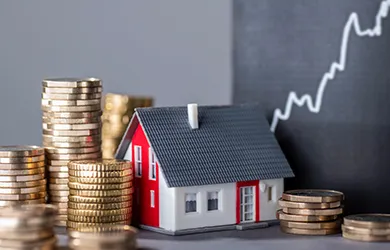- Our Story
- Our Impact
-
Our Projects
Residential
Commercial
- Careers
Ready-to-move-in vs. under construction - how do you choose?
By Lodha
June 04, 2020The COVID-19 pandemic has underscored the significance of homeownership, emphasizing security and stability amid uncertain times. As individuals reevaluate their living arrangements, the debate between purchasing a ready-to-move-in home versus investing in an under-construction project becomes increasingly pertinent. Real estate professionals advocate for a thorough consideration of personal needs and priorities when making this decision. Homebuyers need to assess the advantages and disadvantages of both options before concluding. In this blog, we state the key distinctions between ready-to-move-in and under-construction properties to aid in informed decision-making.
Exploring the Pros and Cons of Under-Construction Properties
Properties under construction come with flexible pricing options like staggered payment plans and many attractive offers attached to the price tag, making them easier on the wallet than ready-to-move-in homes. With all other factors like location, size and amenities remaining the same, a property under construction is often slightly more affordable than a completed home with the same features. The difference in pricing can range anywhere from 10% to 30% or more.
Another upside to purchasing a property that's under construction is that it is mandated to be registered under the Real Estate (Regulation and Development) Act (RERA). This legislation gives you many advantages like builders' compliance with fair trade practices, reduction in project delays, and speedy redressal of grievances. You will also get a wider choice of units to select from, plan for any alterations in the layout as per your requirement, choose the floorings, etc.
Properties under construction also make for excellent investment options, primarily because there's a longer window of time between paying for the property and selling it. Additionally, the GST rates on under-construction houses have also been slashed down to 5% from the earlier 12%.
What, then, is the other side of the coin for these properties? The most evident downside to purchasing a property under construction is the possibility of the builder defaulting. Many builders either cause excessive delays in the project or fail to deliver the house altogether, which can result in heavy financial losses for you. To avoid this costly mistake, it's advisable to buy only from trusted builders with years of industry experience and a history of consumer satisfaction. Another possible problem with under-construction houses is that new regulatory policies or unforeseen circumstances could affect their prices and/or delivery.
Navigating the Pros and Cons of Ready-To-Move-In Houses
If you're considering putting your money on a completed residential property, you have many reasons to rejoice. Firstly, you get what you see, and there are no surprises here. With ready-to-move-in homes, you can get a first-hand look at how a property is constructed before deciding to buy it. Also, there's no possibility of discrepancies in layouts, features, or amenities, since everything is available for inspection beforehand.
Ready-to-move-in homes also offer many advantages from a financial standpoint. All the costs are transparently laid out to you before you sign the deal. You can benefit from greater clarity on the total costs of purchasing and living in a completed property, with details like the maintenance charges, EMIs, and other additional fees explained to you beforehand. With ready-to-move-in houses, you will also save on paying the GST. Once you've completed the formalities related to payment and paperwork, the unit is yours to move into and enjoy the lifestyle. On the flip side, ready-to-move-in homes do not offer much scope for any internal modification to your space. Also, they may cost higher compared to under-construction homes.
Important Factors to Consider Before Making a Decision
Budget and Affordability: Assess your financial situation and determine whether you can afford the upfront cost of a ready-to-move-in property or if you're willing to wait for the potentially lower price of an under-construction unit.
Timeframe: Consider your urgency to move in or start earning rental income. If time is of the essence, a ready-to-move-in property might be the ideal choice. However, if you're willing to wait for customization and potentially lower prices, an under-construction property could be the way to go.
Risk Tolerance: Evaluate your risk tolerance regarding potential delays, changes in regulations, or unforeseen construction challenges. Under-construction properties inherently carry more uncertainty compared to ready-to-move-in units.
Location and Amenities: Research the location and amenities offered by both types of properties. Determine which aligns best with your lifestyle, preferences, and long-term goals.
Choosing between ready-to-move-in and under-construction properties ultimately depends on your unique circumstances, preferences, and investment objectives. While ready-to-move-in properties offer immediate gratification and peace of mind, under-construction properties provide the opportunity for customization and potentially lower costs. By carefully weighing the pros and cons and considering your financial situation and lifestyle needs, you can make a well-informed decision that aligns with your real estate goals.
Frequently Asked Questions
Are home loan interest rates the same for ready and under-construction properties?
While home loan interest rates remain consistent regardless of the property type, the financial strain on the homebuyer could be greater for an under-construction property. This is due to the potential need to manage both rental payments and EMIs simultaneously.
Is property price negotiable in the case of both ready and under-construction properties?
Ideally, homebuyers should negotiate for both ready-to-move-in and under-construction properties. However, there is typically more room for negotiation with under-construction properties since the construction is not yet completed.
Are homebuyers eligible for a construction loan in an under-construction property?
Homebuyers become eligible for a home construction loan only when they are actively engaged in the process of building their own home.
You may also like



 Enquire
Enquire
 Call
Call
 chat
chat
 Search
Search




